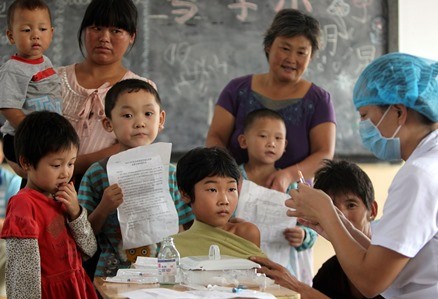The United Nations International Children's Emergency Fund (UNICEF) has acclaimed the Chinese government for its successful efforts in protecting millions of children from diseases, as it urged the country to sustain its efforts to ensure that every child is vaccinated.
According to a report published by Women of China, UNICEF sent its congratulatory remarks on the eve of World Immunization Week on April 24-30.
UNICEF said that China's achievement, whose National Day for Child Immunization fell on April 25, strengthens the global agenda under the slogan "Children's Rights and Society's Responsibility."
According to the report, China introduced immunization in 1978 with the Expanded Program on Immunization (EPI), which was responsible for the drop in mortality and morbidity caused by diseases, such as polio, measles, tetanus, pertussis, diphtheria, hepatitis B, meningitis and Japanese encephalitis.
The country's success in accomplishing this has resulted in reaching the Millennium Development Goal of reducing mortality to 12 deaths per 1,000 births, far ahead of schedule.
In addition, China's strong vaccination efforts made it possible for the country to be declared polio-free in 2000 and successfully prevented an outbreak of imported polio in 2011.
The agency said that China has also dramatically reduced the prevalence of chronic hepatitis B infection to less than 1 percent among children under five years of age--more than the goal of 2 percent for the region.
"Immunization is one of the most successful and cost-effective public health interventions a country can make to reduce mortality and protect its citizens. China's success story in saving millions of children's lives and shielding them from illness and disability through a strong immunization program has been a testimony to this investment and an inspiration for many countries around the world," Tim Sutton, UNICEF China's Officer-in-Charge, was quoted as saying.
China sought to create a national immunization program during the 1980s, with the help of UNICEF and WHO. Since then, it has worked to maintain these services and tailor vaccine programs to access its hardest-to-reach communities, the report added.



























